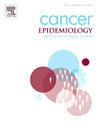Allergic disease and risk of multiple myeloma: A case-control study
IF 2.3
3区 医学
Q3 ONCOLOGY
引用次数: 0
Abstract
Background and aims
Multiple myeloma (MM) is responsible for significant morbidity and mortality, yet our knowledge regarding MM aetiology remains limited. We investigated whether a history of allergic conditions is associated with MM risk.
Methods
Incident cases (n = 782) of MM were recruited via cancer registries in Victoria and NSW. Controls (n = 733) were siblings (n = 436) or spouses (n = 297) of cases. Unconditional logistic regression was used to estimate odds ratios (OR) and 95 % confidence intervals (CI) for associations between self-reported allergic conditions (asthma, eczema, food allergy, hay fever) and MM risk.
Results
Eczema was inversely associated with MM risk (OR = 0.54, 95 %CI = 0.42–0.70), as was a combined history of food allergy and eczema (OR = 0.52, 95 %CI = 0.29–0.93). There was an inverse association between a history of any allergic condition (compared with none) and risk of MM (OR = 0.68, 95 %CI = 0.55–0.84). In the mean-centred dose-risk analysis the OR was 0.87 (95 %CI = 0.73–1.04) per additional allergic condition of interest. No notable associations were identified for food allergy, asthma, or hay fever alone.
Conclusions and future directions
We found that a history of allergic disease, particularly eczema, was associated with reduced MM risk. Further research is recommended to confirm findings and investigate potential mechanisms.
过敏性疾病与多发性骨髓瘤风险:一项病例对照研究
背景和目的多发性骨髓瘤(MM)的发病率和死亡率很高,但我们对其病因的了解仍然有限。我们调查了过敏史是否与MM风险相关。方法通过维多利亚州和新南威尔士州的癌症登记处招募MM病例(n = 782)。对照(n = 733)为病例的兄弟姐妹(n = 436)或配偶(n = 297)。使用无条件逻辑回归来估计自我报告的过敏状况(哮喘、湿疹、食物过敏、花粉热)与MM风险之间的比值比(OR)和95% %置信区间(CI)。结果湿疹与MM风险呈负相关(OR = 0.54, 95 %CI = 0.42-0.70),食物过敏和湿疹合并史与MM风险呈负相关(OR = 0.52, 95 %CI = 0.29-0.93)。任何过敏史(与无过敏史相比)与MM风险呈负相关(OR = 0.68, 95 %CI = 0.55-0.84)。在以平均为中心的剂量风险分析中,每增加一个感兴趣的过敏状况,OR为0.87(95 %CI = 0.73-1.04)。没有发现食物过敏、哮喘或花粉热单独的显著关联。结论和未来方向我们发现过敏性疾病史,特别是湿疹史与MM风险降低相关。建议进一步研究以确认发现并调查潜在的机制。
本文章由计算机程序翻译,如有差异,请以英文原文为准。
求助全文
约1分钟内获得全文
求助全文
来源期刊

Cancer Epidemiology
医学-肿瘤学
CiteScore
4.50
自引率
3.80%
发文量
200
审稿时长
39 days
期刊介绍:
Cancer Epidemiology is dedicated to increasing understanding about cancer causes, prevention and control. The scope of the journal embraces all aspects of cancer epidemiology including:
• Descriptive epidemiology
• Studies of risk factors for disease initiation, development and prognosis
• Screening and early detection
• Prevention and control
• Methodological issues
The journal publishes original research articles (full length and short reports), systematic reviews and meta-analyses, editorials, commentaries and letters to the editor commenting on previously published research.
 求助内容:
求助内容: 应助结果提醒方式:
应助结果提醒方式:


